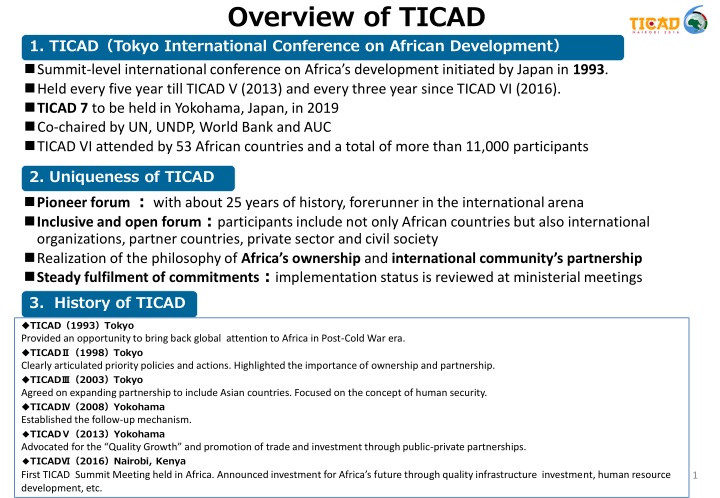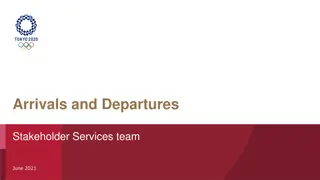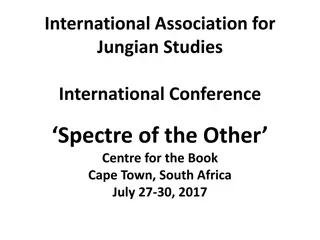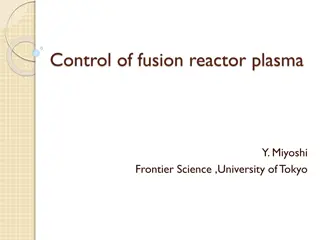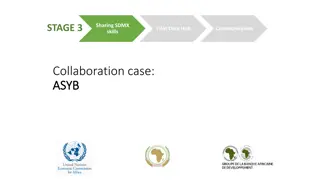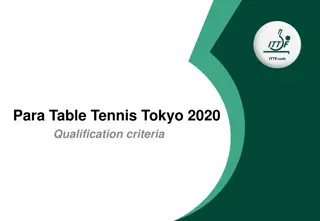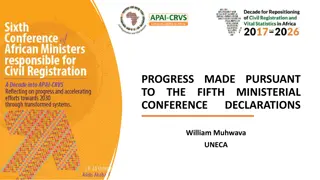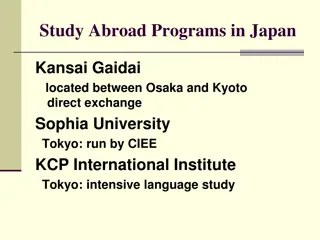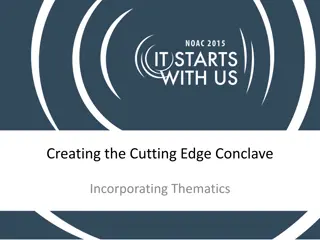Tokyo International Conference on African Development (TICAD): Overview and Themes
TICAD is a significant international conference initiated by Japan in 1993 to promote Africa's development through partnerships with global stakeholders. With a history of over 25 years, TICAD focuses on economic diversification, resilient health systems, and social stability in Africa. The conference emphasizes quality infrastructure, human resource development, and public-private partnerships to support Africa's growth and stability.
Download Presentation

Please find below an Image/Link to download the presentation.
The content on the website is provided AS IS for your information and personal use only. It may not be sold, licensed, or shared on other websites without obtaining consent from the author.If you encounter any issues during the download, it is possible that the publisher has removed the file from their server.
You are allowed to download the files provided on this website for personal or commercial use, subject to the condition that they are used lawfully. All files are the property of their respective owners.
The content on the website is provided AS IS for your information and personal use only. It may not be sold, licensed, or shared on other websites without obtaining consent from the author.
E N D
Presentation Transcript
Overview of TICAD 1. TICAD Tokyo International Conference on African Development Summit-level international conference on Africa s development initiated by Japan in 1993. Held every five year till TICAD V (2013) and every three year since TICAD VI (2016). TICAD 7 to be held in Yokohama, Japan, in 2019 Co-chaired by UN, UNDP, World Bank and AUC TICAD VI attended by 53 African countries and a total of more than 11,000 participants 2. Uniqueness of TICAD Pioneer forum with about 25 years of history, forerunner in the international arena Inclusive and open forum participants include not only African countries but also international organizations, partner countries, private sector and civil society Realization of the philosophy of Africa s ownership and international community s partnership Steady fulfilment of commitments implementation status is reviewed at ministerial meetings 3. History of TICAD TICAD 1993 Tokyo Provided an opportunity to bring back global attention to Africa in Post-Cold War era. TICAD 1998 Tokyo Clearly articulated priority policies and actions. Highlighted the importance of ownership and partnership. TICAD 2003 Tokyo Agreed on expanding partnership to include Asian countries. Focused on the concept of human security. TICAD 2008 Yokohama Established the follow-up mechanism. TICAD 2013 Yokohama Advocated for the Quality Growth and promotion of trade and investment through public-private partnerships. TICAD 2016 Nairobi, Kenya First TICAD Summit Meeting held in Africa. Announced investment for Africa s future through quality infrastructure investment, human resource development, etc. 1
Sixth Tokyo International Conference on African Development TICAD Prime Minister Abe served as co-chair along with Mr. Uhuru Kenyatta, President of Kenya (the host country), and Mr. Idriss Deby Itno, President of the Republic of Chad (Chairperson of the African Union (AU)). Participants Over 11,000 people participated, including the representatives of 53 African countries as well as development partner countries and Asian countries, international and regional organizations, the private sector, and civil society. A business mission with leaders from 77 Japanese businesses and universities accompanied Prime Minister Abe. Prime Minister Abe announced that for a period of three years from 2016 to 2018, Japan will invest for the future of Africa through implementing measures centering on developing quality infrastructure, promoting resilient health systems and laying the foundations for peace and stability, amounting to approx. USD 30 billion under public-private partnership. These measures include human resource development to 10 million people ( Empowerment ) by making use of the strength of Japan ( Quality ). Outline of the conference 2
Theme 1 (economic diversification and industrialization) Transforming economic structures dependent on primary products was raised as a means of responding to declining international resources prices. Participants shared a view on the importance of investing in high quality infrastructure, including developing roads and ports and renewable energies (such as geothermal electric power generation), building food value chains, and developing industrial human resources. Theme 2 (resilient health system) The two themes of strengthening responses to public health crises and Universal Health Coverage (UHC) were raised, and participants shared a view on the importance of strengthening each country s capacity to prevent, prepare for, and respond to crises alongside international efforts, and of promoting UHC in order to deal with the broad-ranging health issues that Africa faces. Theme 3 (social stability) Promoting social stability in order to respond to social instability and the increased risk of natural disasters arising from climate change were raised. Participants shared a view on the importance of issues such as employment generation through job training for women and youths, strengthening public security capabilities, disaster risk reduction and food safety security. 3
TICAD Ministerial Meeting 24-25 August (Maputo, Mozambique) August 2017 African Affairs Department Participants Representatives of 51 African countries (16 foreign ministers, 9 other ministers, 12 minister-level officials), development partners including Asian countries, international and regional organizations, and civil society, etc. Mr. Taro Kono, Minister for Foreign Affairs, Mr. Manabu Horii, Parliamentary Vice-Minister for Foreign Affairs , and Mr. Arata Takebe, Parliamentary Vice-Minister of the Environment participated from Japan. Overview of the Meeting [Opening Session] Foreign Minister Kono referred to the Free and Open Indo-Pacific Strategy announced by Prime Minister Abe on the occasion of TICAD VI, emphasizing the importance of strengthening connectivity between Asia and Africa through quality infrastructure investment and a maritime order based on the principles of international law, such as the freedom of navigation reflected in the United Nations Convention on the Law of the Sea (UNCLOS). He also introduced that Japan is advancing negotiations for investment agreements in order to develop an environment to encourage private sector investment in Africa. [Plenary Session 1: Overview of Progress since TICAD VI] Foreign Minister Kono explained that Japan has implemented initiatives worth approximately 5 billion USD in line with the three pillars of the Nairobi Declaration (economic diversification and industrialization, health, and social stability) since 2016, and that the total value of the initiatives had reached 26.7 billion USD between 2013 (TICAD V) until 2016. He also stressed the importance of further efforts to encourage private sector investment.
Overview of the Meeting Continued.) [Plenary Session 2: Economic Transformation for Africa s Growth] Parliamentary Vice-Minister for Foreign Affairs Manabu Horii presented the progress of initiatives to encourage private sector investment including industrial human resources development through the ABE Initiative and financing from government agencies into projects by private sector companies, etc. [Plenary Session 3: Promoting Human Security and Resilient Society] Parliamentary Vice-Minister for Foreign Affairs Manabu Horii introduced initiatives to achieve sustainable and inclusive development such as (1) cooperation in the health field including capacity-building to fight against infectious diseases and promotion of universal health coverage (UHC), and (2) contributions for social stability in the areas of agriculture, food security and vocational training for youth. TICAD Progress Report 2017 and Japan s Initiatives 2017 were presented to the Ministerial Meeting. Co-chairs Summary was produced to record the main points of the discussion in each session. Japan s Assistance in the Aviation Field (Recent developments) Japan has recently signed the agreement on aviation-related infrastructure assistance with African countries such as: Egypt ( Extension of Borg El Arab International Airport ) Mauritania ( Provision of security equipment ) Malawi ( Expansion of the Terminal Building at Kamuzu International Airport ) In addition to the provisions of infrastructure and materials, Japan has carried out trainings for personnel engaged in the area of aviation from different African countries every year (e.g. capacity building for officers in charge of airport security, customs and immigration, etc. )
